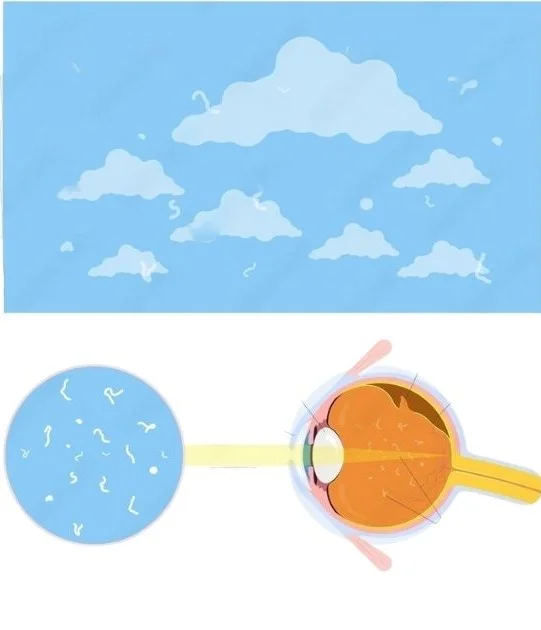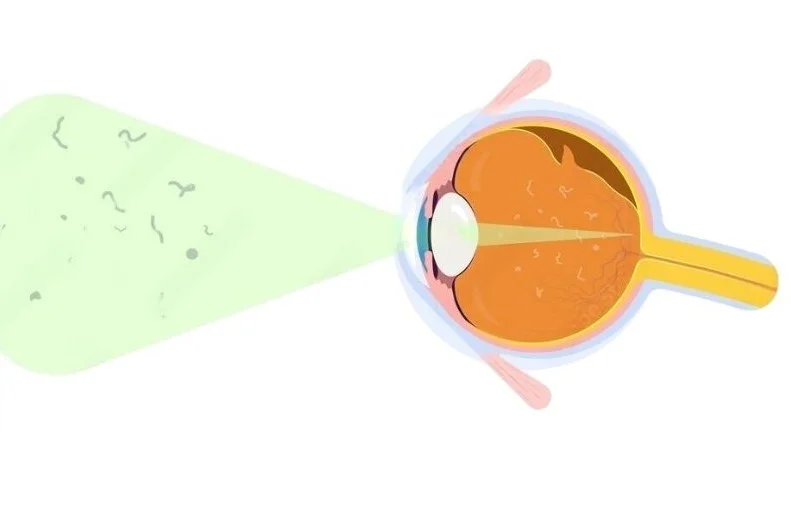What Are Eye Floaters?
Floaters are like tiny specks or threads that float around in your vision, especially when you're looking at something bright, like a clear sky or a white wall. These little things are actually shadows made by proteins in our jelly like structure floating inside your eyes.
Eye floaters become more common as we age. They don’t normally go away, but they don’t usually need treatment. Over time, your brain adapts, and you don’t notice them as much.
At what age eye floaters usually appear?
For the majority of people, eye floaters begin to appear between the ages 50-70. But, you might observe a few floaters at earlier or later. Also, if you have high minus glasses or high myopia.
If you're under 50 and notice constant floaters, talk to your eye care professional. It could be an indication of an eye disease that is more serious.
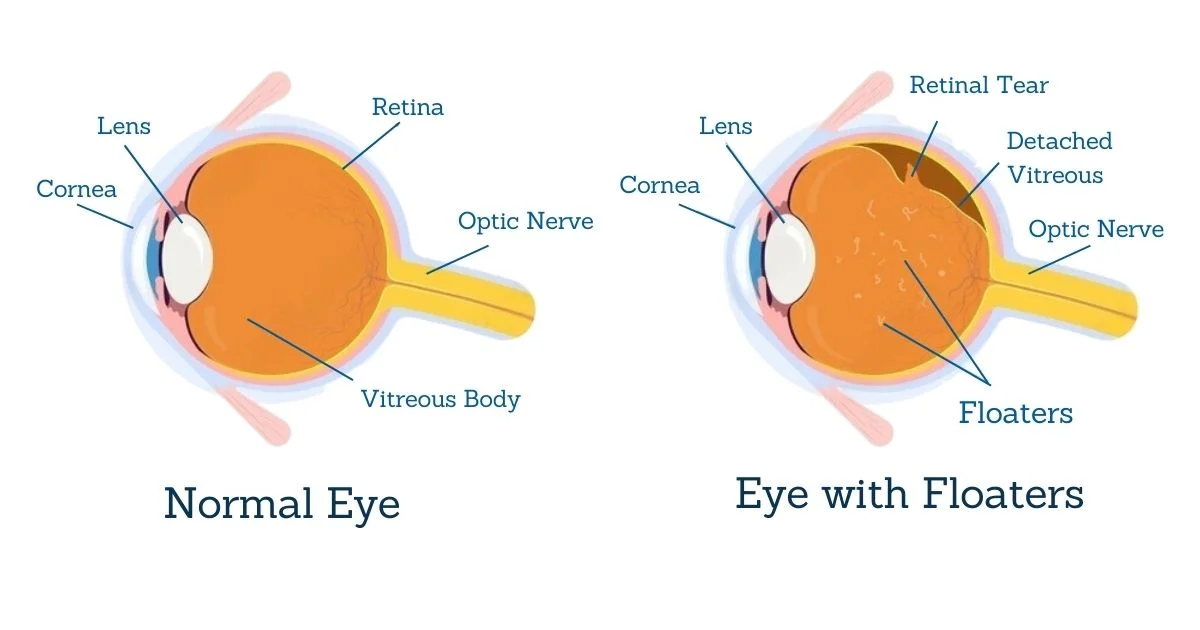
What are the symptoms of Eye Floaters?
Symptoms that can be related to this eye problems are:
- Black or grey dots
- Blobs
- Wiggly lines, strands, or 'worms'
- Cobwebs
- Rings
What creates floaters in the eye?
- Getting Older: As we age, jelly degenerate and accumulate at one point and cast a shadow.
- Eye Injuries: If something hits your eye, it can release tiny particles that create these specks.
- Eye Infections or Swelling: When your eye gets infected or swollen, it can cause these little things.
- Problems with the Eye's Retina: If the retina of your eye has issues, it might result in these spots.
- Diabetes: Diabetes can cause Vitreous haemorrhage which can lead to floaters.
- Nearsightedness: If you have trouble seeing things far away, you might be more likely to have these.
- Migraines: Some people see these spots as part of a migraine headache.
Most floaters are safe and frequent, but rapid and dramatic changes or new floaters can indicate a more significant eye disease.
When should I see an eye specialist?

You should consult an eye specialist if:
- You notice an increase in the size or number of floaters visible in your vision.
- you see flashes or light that appear in your vision particularly if they're coupled with floating.
- You observe changes to your visual perception, for example blurred vision, or a darker peripheral vision, as well as floating.
- you've had a history of eye issues or other conditions that can make you more susceptible to eye issues.
- you notice that your symptoms continue to persist or get worse over time, regardless of home solutions or lifestyle adjustments.
Can eye floaters be prevented?
No, eye floaters cannot be prevented. They are a natural part of the aging process and occur as the gel-like substance in the eye changes consistency over time.
Treatment of Eye Floaters
- Observation: If the situation is not severe and is not hurting your vision, your doctor may recommend monitoring them. Sometimes, it reduces with time or our eyes adapt or learn to ignore them.
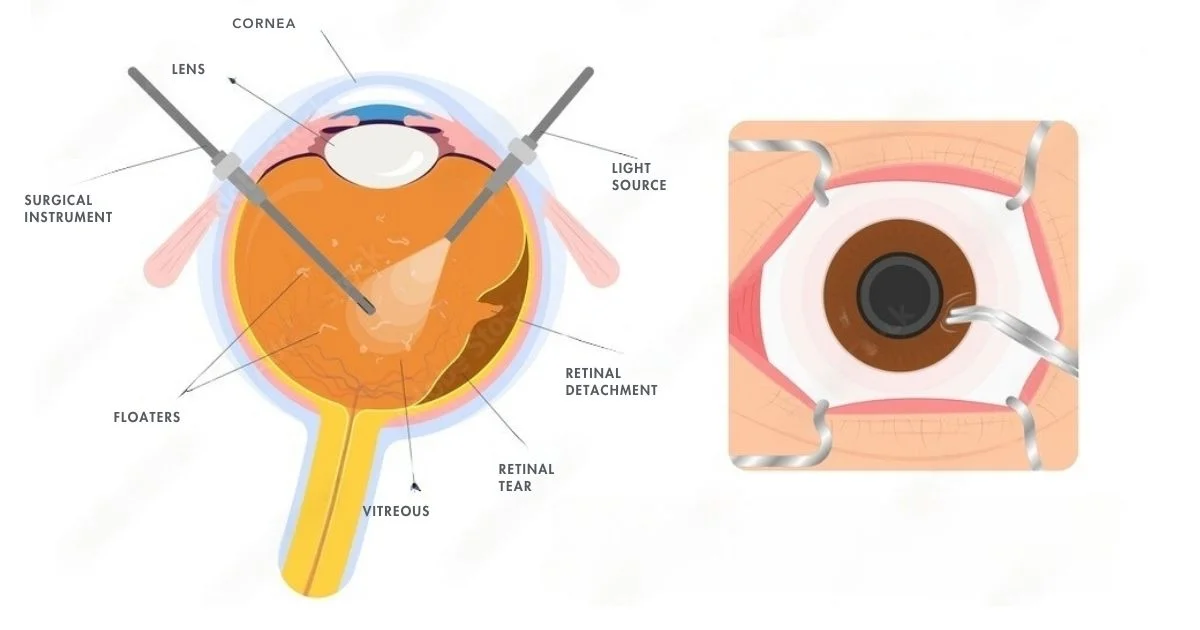
- Surgery: A vitrectomy may be recommended in severe cases, especially if these are causing visual issues. The doctor removes the vitreous gel and replaces it with a clear solution. It can minimize or remove them.
- Fixing Underlying Causes: Treating an eye problem such a retinal tear or detachment that causes flashes and floaters is crucial. Surgery or other treatments may be needed.
- Lifestyle changes: Eating healthier, managing diabetes, or stopping smoking can help decrease them. Choose foods which contain antioxidant because they can degenerate the process of its creation.
What are the Precautions?
- Regular Eye Exams: If you see new floaters, see an eye specialist. Early detection can prevent problems.
- Diabetes: Manage your diabetes to avoid diabetic retinopathy, which can cause it and other eye problems.
- Maintain an active life by eating well, exercising, and avoid smoking.
- Manage Stress: Stress can cause migraines with auras and visual abnormalities. Manage stress to prevent such occurrences.
How are eye floaters diagnosed?
Eye floaters are diagnosed through a comprehensive eye examination by an eye specialist. During the check-up, the doctor will ask about your symptoms and medical history and perform tests to evaluate the health of your eyes. These tests may include:
- Visual Acuity Test: This test assesses your ability to see details at various distances and helps identify potential vision problems.
- Dilation: Your pupils may be dilated for better view of your retina and the vitreous.
Frequently Asked Questions (FAQs)
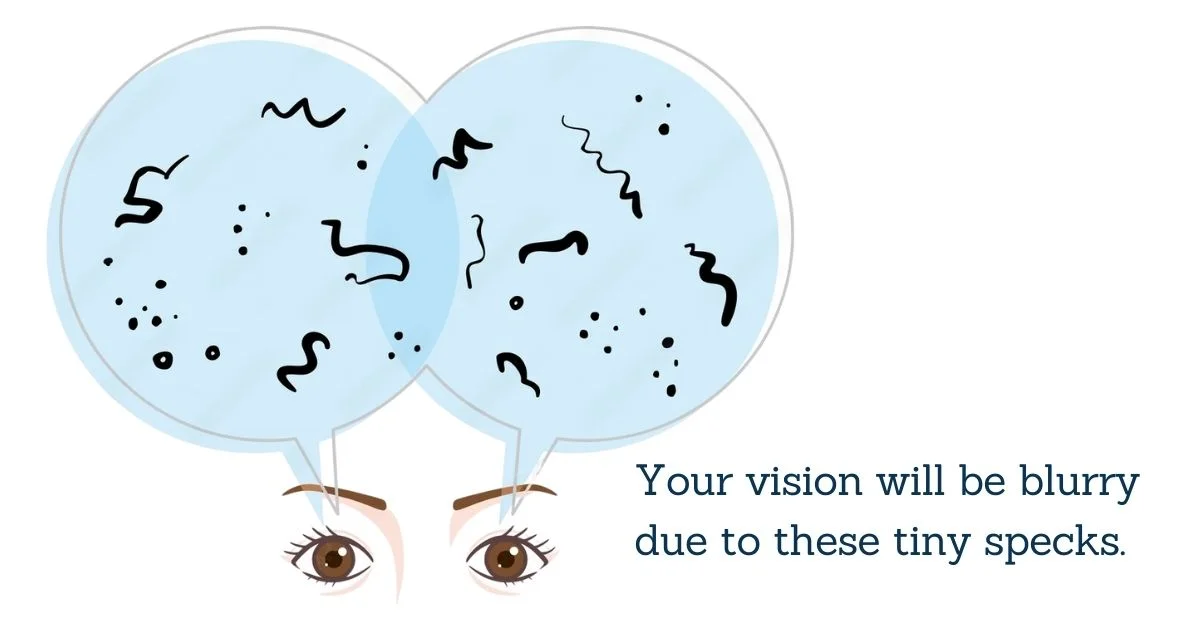
Q.1 How can I fix eye floaters naturally?
Ans: There is no such natural treatment of floaters. But it is advised to drink more water, add antioxidants in diet. This can help reduce their intensity and severity.
Q.2 What is the best treatment for eye floaters?
Ans: Observation and surgery (vitectomy) are the best treatment options.
Q.3 What is the main cause of eye floaters?
Ans: When the Vitreous humour (gel-like substance gradually softens with age, becoming thinner and eventually liquid as we get older, leading to floating floaters developing on their surface.
Q.4 Will eye floaters go away on their own?
Ans: Only a few patients face this for longer. However, it reduces over time for the most of the people.
Q.5 Do eye floaters cause complications?
Ans: Eye floaters are usually harmless. However, in certain cases they could indicate more serious conditions like retinal break that require immediate treatment. Otherwise it can lead to retinal detachment.
Q.6 What do eye floaters look like?
Ans: Eye floaters may appear as grey or black dots, blobs, lines, cobwebs, strands or rings floating about your field of vision.
Q.7 Can eye floaters happen in only one eye or both eyes at the same time?
Ans: It can happen in one eye or both eye at the same time.
Q.8 Are eye floaters an emergency?
Ans: No, generally it’s not an emergency but regular check-ups can prevent from severe retinal complications.
Q.9 At What age Floaters can be seen?
Ans: Floaters can be seen at any age, but they become more common as you get older, typically after the age of 50.
Q.10 Does it cause due to lack of Vitamin D?
Ans: There's no direct link between floaters and a lack of Vitamin D.


